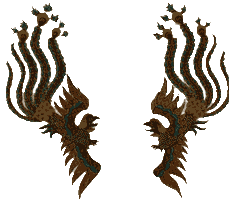Maha Guru or Guru Besar
According to the Bahasa Indonesia dictionary, 'guru' is a person
who has teaching as profession. 'maha' originally derives from
Sanskrit, meaning 'great/big'. Therefore 'mahaguru' is synonym
of 'guru besar', and it is used to designate founding teachers
and grand masters.
In Indonesia, not every pencak silat group is inclined to use the designation
''mahaguru/guru besar'. Let's examine for example the so-called
'pencak silat keluarga' ('keluarga' meaning 'family') like
Permainan Rachmad, Bang Mahdi, Bang Kare, Bang Sabeni and Bang Pi'i. These
groups have as common characteristic that they don't have an organization
(perguruan) with members. The teaching of pencak silat is mostly
only for the family. The teachers do not like to present themselves as
'guru besar'.
The same is true for the 'pencak silat aliran' ('aliran'
meaning 'style') such as Cimande, Cikalong, Cingkrik, Cikaret, Timbangan,
Serak, Beksi, Kwitang, Bojonegaran, Gusti Harimurti, Silek Tuo, Starlak,
Kumango, Lintau , Pauh, Painan, Sungai Patai, Bawean, Podai. Pencak silat
aliran have plenty of members, but still don't have an organization. The
vertical relationship between the guru and individual members is very
close but among them the members are not interrelated. The founders generally
have a low profile and don't want to present themselves as 'guru'.
However, outsiders often call them 'guru besar'.
For the so-called perguruan or persaudaran the situation
is again different. These organizations are generally founded by somebody
who is expert in pencak silat and who by mixing different techniques and
styles is able to make a new version of pencak silat. They are organized
around the guru but have also strong horizontal relationships among
the members. Some of them see the guru as an 'older brother' others
as a 'father'. For example, in the Persaudaraan Setia Hati (1903), the
largest pencak silat organization in East Java, the guru is called
'kadang tuo'/saudara tua, which means 'older brother'. Instead
in the Perhimpunan Pencak Silat Panglipur (1907), a federation of different
perguruan, the guru's are called Aba (father).
In other words, not many in Indonesia would easily use the title "guru
besar" but prefer more familiar forms of respect. The title "guru
besar" is heavy to carry on somebody's shoulders. The "guru
besar" is like a "kaca benggala" (mirror) who
has always to show the best attitude and behavior to his/her disciples
because as we know pencak silat is not only sport, self-defense and art,
but also spiritual and humanistic education.
back
to main page • back to reflections
